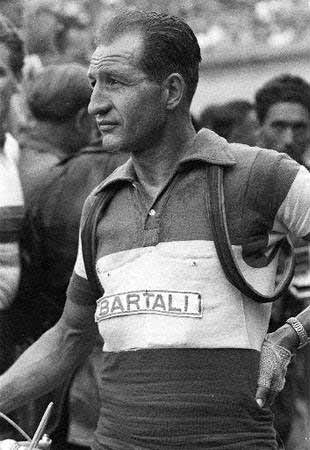 At his prime, Italian cyclist Gino Bartali was most famous for winning the Tour de France in 1938 and 1948, the longest gap ever between Tour wins. In the struggle to rebuild democratic Italy after World War II, his victory helped unify the country when struggles between centrist Catholics and the Communist Party almost caused a civil war. Though unknown globally, he remains one of his nation’s icons of sportsmanship.
At his prime, Italian cyclist Gino Bartali was most famous for winning the Tour de France in 1938 and 1948, the longest gap ever between Tour wins. In the struggle to rebuild democratic Italy after World War II, his victory helped unify the country when struggles between centrist Catholics and the Communist Party almost caused a civil war. Though unknown globally, he remains one of his nation’s icons of sportsmanship.Only decades later did the world discover how Bartali used his fame and athletics to aid Italian Jews facing systematic persecution during the German occupation. Who better than a renowned cyclist, wanting to keep in shape, to convey sensitive documents and fake ID long distances? And when you want to distract the SS and Polizia from a train smuggling Jews across enemy lines, a sports celebrity can keep all eyes away from the refugees.
Siblings Aili and Andres McConnon reconstruct Bartali’s rise and heyday, from poor roots in an mountain village. At a time when most sports were the exclusive domain of rich sybarites, cycling was refreshingly egalitarian. With only a sixth grade education, Bartali worked for a local bike repairman, learning make-do maintenance skills that would serve him on the professional circuit, saving to buy the secondhand bike that changed his life.
But riding wasn’t a value neutral activity in Bartali’s youth. With the country under the heel of Benito Mussolini, the Fascists used athletes as propaganda instruments. They wanted to reawaken a perceived warrior spirit they believed Italy had lost. The rising star’s every victory got turned into a poster. Bartali, raised by a strict Catholic father to distrust Fascist power, found himself trapped in a monster he couldn’t resist.
So Bartali offered a perfect response: he ignored the machine he was forbidden to criticize. After his first Tour victory, he thanked everybody except Mussolini and the Fascist regime. You can imagine how Il Duce took that slight. But as the “poor boy made good” narrative took Italian fanatics by storm, the state found itself with only one way to silence Bartali: it drafted him, cancelled Italian races, and stopped international sports.
 Like that would stop a True Believer. Bartali became Italy’s most famous (or infamous) deserter. And he came under the increasing influence of Cardinal Elia Della Costa, archbishop of Florence. Della Costa taught Bartali how to dance the fine line between law and conscience, and brought him into the conspiracy to rescue Jews from the encroaching machine. To this day we don’t know Bartali’s true contribution to this act of far-reaching heroism.
Like that would stop a True Believer. Bartali became Italy’s most famous (or infamous) deserter. And he came under the increasing influence of Cardinal Elia Della Costa, archbishop of Florence. Della Costa taught Bartali how to dance the fine line between law and conscience, and brought him into the conspiracy to rescue Jews from the encroaching machine. To this day we don’t know Bartali’s true contribution to this act of far-reaching heroism.The McConnons go beyond retelling the story. They are no mere journalists, content to recount the facts of the case. They delve into the emotions behind the circumstances; the history behind seemingly unrelated events; the risk that these heroes took resisting a powerful, intolerant state. Many people involved in Bartali’s story, including his wife and several former teammates, are still alive, and the McConnons interviewed them, conveying their first-hand urgency.
The war put Bartali through serious turmoil. With all the races, and their attendant prize money, on hiatus for several years, he struggled to feed his growing family. His resistance activities nearly cost him his life, including one occasion when his sports heroism couldn’t even save him. Only brief twists of fate kept him off the train bound for Auschwitz. Yet he kept up the fight, because his Catholic faith told him it was right.
He also kept his secrets. Even his wife didn’t know about his heroic interventions until well after the war. Nazi resisters like Bartali often had to work in the dark, and few records were ever kept; even fewer survive. Therefore, we only know as much as survivors tell us, and Bartali said little. In a turn of humility that would seem alien to today’s glory-hungry athletes, he refused to let his sports celebrity take anything from the people he considered the real heroes.
Bartali could have traded on his war heroism. Catholic centrists tried to make him their poster boy after the war, but he refused. Instead, he electrified Italy, and the world, with a come-from-behind Tour victory. This man, prematurely aged by the war, older than nearly any other Tour winner ever, overcame a crushing handicap to win by one of the largest leads ever. Sort of a symbol for postwar Italy, really.
The McConnons brew an exciting stew of sports, history, conspiracy politics, and the war that redefined the modern world. Their narrative holds on tight and brings readers on an emotional ride you won’t forget soon.
No comments:
Post a Comment